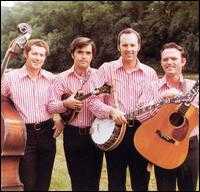The Country Gentlemen expanded the definition of "bluegrass" -- they were progressive bluegrass before the term existed. The Gentlemen came along with the first wave of the folk music revival in the late '50s and quickly made a name for themselves as a band that could not only play traditional material straight, but also brought Bob Dylan and contemporary country material into the genre. Because of their exceptional singing and virtuoso instrumentals, the Gentlemen attracted a broad audience, ranging from traditional country/bluegrass fans to folk and soft rock lovers.
Formed in Washington, D.C., on July 4, 1957, the original lineup of the Country Gentlemen featured guitarist/vocalist Charlie Waller -- who has led the band through all of its numerous incarnations -- mandolinist/vocalist John Duffey, banjoist Bill Emerson, and bassist Tom Morgan. Waller had spent time with a number of country string bands in the early '50s, most notably Buzz Busby's band, the Bayou Boys, which also featured Emerson. After the Bayou Boys suffered a car crash in early 1957, Waller and Emerson put together a group to fulfill the band's regular spot at a Virginia venue while various members were recovering. That replacement band evolved into the County Gentlemen.
For the first two years of their existence, the Country Gentlemen went through numerous lineup changes. In 1959, they finally landed on a permanent lineup, with banjoist Eddie Adcock and bassist Tom Gray joining a band that already included Waller and Duffey. This lineup secured a contract with Starday Records and released a handful of singles, as well as one album, Traveling Dobro Blues. Following their Starday recordings, the group moved to Folkways, where they released three albums, including their breakthrough, Country Songs Old & New. After their stint at Folkways, the group moved to Mercury in 1963, where they released Folk Session Inside. The following year, they began a long association with Rebel Records.
During the '60s, the Country Gentlemen built up a dedicated fan base in America through constant touring. Although their lineup shifted rapidly -- following Gray's 1964 departure, they went through several of bassists before settling on Ed McGlothlin -- their sound pretty much stayed the same. At the end of the '60s, the core lineup began to splinter as Duffey left in 1969; he was replaced by Jimmy Gaudreau. In the following year, both Adcock and McGlothlin left the lineup. In 1971, the second classic lineup of the Country Gentlemen -- featuring Waller, a re-joined Bill Emerson, mandolinist Doyle Lawson, and bassist Bill Yates -- fell into place and stayed together for two years. For the next 20 years, various lineups of the Country Gentlemen, which were all led by Waller, remained popular on the bluegrass festival circuit.
Source: http://www.allmusic.com/cg/amg.dll?p=amg&sql=11:wifqxq95ldse~T1
